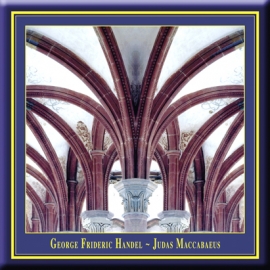Musica Florea Prague
Baroque Orchestra
The Musica Florea ensemble was established in 1992 by a group of young professionals who united their common interest in the study and authentic performance of Baroque music on period instruments. The ensemble very soon achieved their first major successes under the guidance of violoncellist and conductor Marek Štryncl. The first of these included a performance of Missa Sanctissimae Trinitatis by Jan Dismas Zelenka at the Prague Spring International Music Festival in 1995. They were also presented with the highest award for their very first CD recording of the same Mass in the prestigious French music magazine Diapason in April of that year. The ensemble was subsequently invited to perform at several of the most important festivals in the Czech Republic including Prague Spring 1995, St. Wenceslas Festival 1995, Ceský Krumlov International Music Festival 1996, Festival Concentus Moraviae 1996, 1997 (2000), The Strings of Autumn Festival 1996, 1997, 1998, Musica Ecumenica 1998, and regularly to the Valtice Castle Baroque Summer. The ensemble has also performed at numerous foreign music festivals including Stary Sacz in Poland; Tours, Alencon, Le Mans, and Flers in France; Pro Musica Antiqua Bremen 1997 in Germany; the Central European Festival of Concert Art 1998 and Musica Nobilis 1998 in Slovakia; the 1998 Brežice Early Music Festival in Slovenia; the 1998 French Institute Early Music Festival and the 1999 Sopron Early Music Days in Hungary; and Europalia 98 in Belgium. Commissioned by several international festivals for the 1997/98 season, they performed various larger works: J. S. Bach's Magnificat (BWV 243) at the Festival Concentus Moraviae 1997, M. A. Charpentier's Te Deum at the Valtice Festival 1997, and Henry Purcell's The History of Diocletian with the Ensemble Philidor and Les Musiciens du Paradis in France. In September 1998, Musica Florea invited the Slovakian Baroque music orchestra Musica Aeterna and the French Ensemble Philidor to perform a celebration concert together as a large 18th-century Baroque orchestra to present the major orchestra works by J. D. Zelenka at the opening concert of The Strings of Autumn 98 Festival in the Spanish Hall of Prague Castle. December 1998 was devoted to a broad presentation of Czech Republic culture in the very center of Europe, Brussels, where Musica Florea performed at the prestigious Europalia 98 Festival with great success. Mr. Hadelin Donnet, General Music Program Director of Europalia 98 for Czech Radio 3, Vltava, observed, “… it was a very challenging pleasure to hear that in the Czech Republic Baroque music is performed on such a high standard, comparable with all the top ensembles of Europe. Listening to the Missa Sanctissimae Trinitatis of Czech Jan Dismas Zelenka performed by Musica Florea was unforgettable musical experience completing the musical program of Europalia 98.” In 1994, Musica Florea began a series of unique recording sessions for Studio Matouš of works by P. J. Vejvanovsky, J. H. Schmelzer, H. I. F. Biber, Ph. J. Rittler, and other composers from the Kromeriz archives. Musica Florea's magnificent performances with Czech mezzo-soprano Magdalena Kožená earned the ensemble their latest recording success, accompanying arias taken from cantatas and oratorios by J. S. Bach. The recording of these, published under the Archiv Production label of the world-renowned Polygram-Deutsche Grammophon company, won the Golden Harmony Award for best Czech CD recording of 1997. Great success at Slovenia's 1998 Brežice Early Music Festival opened further commissioned cooperation with Slovene Radio Broadcasting in 1999. During the 1999/2000 season, the ensemble performed the music for the Baroque opera Castor et Pollux by J. Ph. Rameau at the Estates Theater of the National Theater Opera in Prague. This was the first performance of a Baroque opera in the modern history of Czech music realized in the period style on period instruments and with period ballet sections, costumes, and scenery, and lighting. During the following two seasons, the ensemble enjoyed some very interesting tours abroad. As a part of the unique Bach 2000 project of the Melbourne International Festival of Arts, Musica Florea along with fifteen other outstanding ensembles of the world performed almost all the cantatas, Masses, and oratorios of J. S. Bach. Later they also toured Germany, Austria, France, Belgium, Netherlands, Poland, Slovakia, Slovenia, and Hungary. For Prague's City of Culture 2000 program, the ensemble prepared a unique historical scenic performance of the coronation oratorio Sub Olea Pacis et Palma Virtutis by J. D. Zelenka, which also opened the Europa Musicale festivals in Germany and the Czech Republic; further special performances of the oratorio were booked for Hungary, Poland, and other venues in Germany. Presenting a broad palette of Baroque music programs reflecting the works of Central European masters of the époque, the ensemble also toured Germany, Austria, France, Belgium, Netherlands, Poland, Slovakia, Slovenia, and Hungary. For the 2000/2001 season, Musica Florea prepared new recording sessions for the Supraphon Recording Company (Czech Republic) and Pure Classics (Germany,) as well as a special live recording for the European Broadcasting Union in March 2000 with Magdalena Kožená. In 1997 Czech TV filmed a documentary about the ensemble, Who is Marek Štryncl and Musica Florea?, and in 1998 they performed in a documentary dedicated to P. J. Vejvanovský and in the artistic documentary The Last Day in Bohemia about J. Haydn. The ensemble appears live on Czech television and radio as well, and the members of Musica Florea are much sought-after as guest performers at concerts both in the Czech Republic and abroad.








